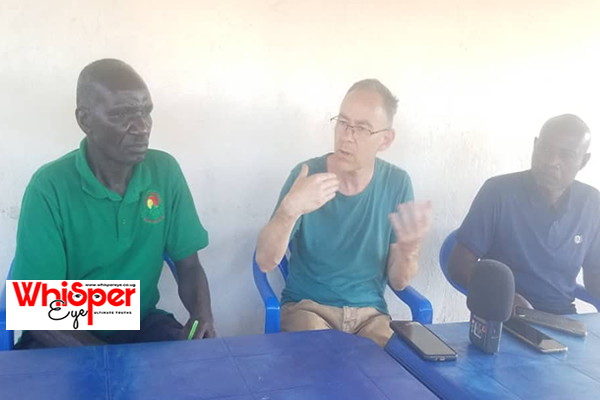CO-OPERAID, a Switzerland-based non-governmental organization that is undertaking a potent
project in Zombo district in the west Nile sub-region aimed at enhancing and ensuring children’s
rights to education has extended its project for another three years in the district. #WhisperEyeNews
The new project will start next year after the completion of the ongoing three-year project dubbed
“Alochi ku somu “(winning with education), which is ending in December this year.
In a press conference with journalists at country cottages in Paidha town council Zombo district on
Monday, May 27, 2024, The CO-OPERAID Co-Director Marcel Auf der Maur whilst announcing the
extension expressed the organisation’s commitment to supporting child rights to education that
dates back to 1991.
He added that much as there is a lot of progress in the programme implementation, a lot still needs
to be done.
“We are in a three-year phase now, it is called the Alochi ku somu project, and we supported 21
schools in the last two years, and it is continuing now and will continue for the next three years in
my opinion. The successes is not overwhelming sure because in infrastructure, for example, we can
see still so many needs in Zombo for new school houses, renovation, wash, sports fields and most of
the schools still have huge gaps. There is still need to intensify work.” Muar explained
He added “ In most of the countries where we work out, we ensure children’s rights to
education is mandatory, every child can go to school or access school though the poverty level is still a
problem to many”
The ongoing 4.1 billion Uganda shillings project funded by CO-OPERAID is being implemented by
a consortium of three local non-governmental organizations namely Life Concern (LICO), community
empowerment for rural development (CEFORD) and Nebbi NGO-forum.
The news about the project extension is already serving as a good music to the ears of many leaders
and locals, most of whom have been severally and jointly appealing to the donor through
implementing partners to extend the project.

This week, officials from CO-OPERAID with a consortium of the three implementing partners has
been in Zombo for a three days’ workshop to assess the ownership of investments which CO-
OPERAID together with partners in the area has been putting in place.
The team upon completing the three solid days ownership assessment also engaged in a joint
robust internal discussion and planning for phase two headed by Marcel Auf Der Maur, the Co-
Director of CO-OPERAID.
In the engagement, a lot of reflection was done on how much the partnership has impacted, the
gap, the new interventions to be focused on phase two effective January 2025-December 2027.
The organization is committed to providing a better future for children, young people and their
families have education projects in Uganda, Kenya, Bangladesh, Cambodia and Laos that support the
development of neglected communities.
Kakura Emmy Kizito, the executive director of Life Concern, a non-governmental organization which is
one of the implementing partners told this publication that the donor was impressed by
impact of the project progressively being implemented by a consortium of NGOs couple with the
overwhelming support community showed during the project assessment.
Kakura revealed that the approach to the phase two project shall be on gaps that were not covered by
phase one.
He added that details about the project extension including funds allocation shall be communicated
later.
“We are looking at the gaps and then we are going to premise the activities based on the gaps and
the challenges we have been facing but also, we are bringing in new interventions within the next
phase, for instance, we are bringing fully the aspect of environment conservation, protection and the
rest of it given that one of the challenges we have been seeing around is the issue of mismanaging
our environment that is leading to global warming” Kakura said
In Zombo district, their ongoing project dubbed “Alochu ku somu” loosely translated as winning with
education started in 2022 and is expected to end in December this year.
The ongoing project came timely in Zombo where a sizable number of schools struggle with
the immense challenge of ailing infrastructure particularly the lack of proper classrooms, forcing learners in
the already overcrowded space thus exacerbating the high learner-teacher ratio hindering and impacting
learning and resulting in even sky-high dropout rate.
The project has seen about 21 schools with indisposed infrastructure receiving mega renovations,
hundreds of youths equipped with employable skills, capacity of teachers boosted and built amongst
other benefits.
Conclusively, the organization ended their engagement with a field visit to a youth group in Atyak
sub-county where the focus was to assess how the youths are being skilled in livelihood and how
they can integrate livelihood in the forthcoming phase together with other skills specifically being
spearheaded by Life Concern under Alochi Ku Somu project.
The team has also engaged in how they can amalgamate the CO-OPERAID interventions to the local
NGOs in livelihoods and skilling to impact change in the education field and livelihood in Zombo.
Crushingly high abuse of drugs has also been cited by local leaders and locals. This has compelled the
organization to focus on the issue of mental health in the forthcoming phase.
John Bosco Okaya, working with Community Empowerment for Rural Development (CEFORD) said
“We started the partnership long ago in 2012 and I want to emphasize the importance and
sustainability of this process and the issues around it was critically looking at the mindset change in
regards to the fight and moving forward in education”.
Phase one of the project saw a whopping 690 million Uganda shillings injected in the
infrastructural improvement in 21 schools across the Zombo district. This is against the backdrop that
Most of the schools were rendered helpless due to insufficient funds to renovate some of their
structures, many of which were condemned because they posed great risks to lives of learners.
Aside from classroom blocks renovation, constructions of teachers houses, new classroom blocks
were equally undertaken to give the schools a good look and improve on the living condition of
teachers respectively . This according to the leaders is steadily addressing the challenge of sky-high
dropout rate in many rural schools across the district.
An allocation of 51 million Uganda shillings has been put on Capacity development of teachers. This
is done through awards in prize to 10 selected teachers and one director (Head master) of the year
which is competitively done in a phased manner. The initiative is aimed at spring boarding
motivation and encouragement to other teachers.
On skilling the youth, the project has in this first phase injected a total of 223 million Uganda
shillings to support the construction and establishment of youth skill centre situated in Dwonga
ward, Paidha town council.
Apparently under the project, plenitude of youths in Zombo have testimonies to tell upon being
equipped with employable skills in different disciplines like tyre repair and maintenance, filming and
videography, tailoring and garment cutting amongst others. This has addressed the challenge of
deep-seated unemployment amongst the work-shy youths.
The LCV chairperson of Zombo James Oruna Oyullu commended the organisation for their generous
support towards education sector in the area adding that it is complementing the work of the
district.
Recently, during an award of teachers selected by Life concern under their capacity development
initiatives in Paidha town council, the deputy resident district commissioner of Zombo Grace Atim
said the CO-OPERAID and implementing partners are standing in the gap of education sector, riddled
with a battery of setbacks. Atim also appealed for the project extension given its remarkable
progress in the community.
Uganda suffers from substantial school infrastructure gaps which needs to be addressed across
board and according to the world bank, due to the ambitious goals for the education system and
rapid population growth, the number of children in primary and secondary school is expected to
nearly double overall by 2025 versus the size of the education system a dozen years earlier.



